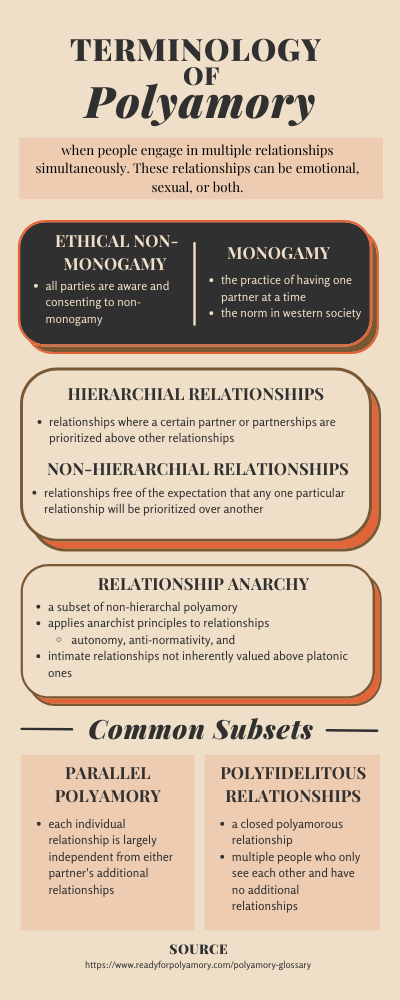Sarah Moore
May 6, 2022
Moore first discovered polyamory in their late twenties when they discussed their constant relationship troubles with their friend.
“I was having emotional connection and physical attraction to other people,” Moore said. “This is usually what would happen in my monogamous relationships, and I felt a lot of shame and guilt for it.”
Their friend suggested they discuss what monogamy meant to them and their partner.
“I said, ‘Hold on what? That’s an option?’” Moore said. “My whole life, I didn’t know there was another option other than monogamy.”
Moore began researching non-monogamous relationships, primarily by reading The Ethical Slut, one of the first books on polyamory and polyamorous relationships.

“I realized, ‘Oh, I don’t think I’ve ever been monogamous,’” Moore said. “I’ve never felt good about being with just one person. So, realizing there’s another option, I was like, ‘I have to try this and see if it is right for me.’”
Moore brought it up with their monogamous partner at the time, and he didn’t feel comfortable with it.
“We decided to end the romantic relationship but continue to be friends,” Moore said.
With an end to their monogamous relationship, Moore began their exploration into polyamory.
“I had some friends who were poly, and I started dating one of them,” Moore said. “I also went on OkCupid, which was the main dating site at the time, and searched for people who had open relationships.”
Moore quickly discovered an “open relationship” meant vastly different things to many people through online dating.
“I spent a lot of time as essentially the side chick,” Moore said. “Married people opened up their relationship to me, and I felt the sting of people shoving me off to the side or not treating me as a person with actual feelings because they had a ‘real relationship to attend to.’”
A relationship in their early thirties was the culmination of these initial negative experiences.
“My partner had been talking to me and his other partner about a person he’d met through school, he had just gone back to college, that he wanted to start a relationship with,” Moore said. “I thought that was extremely poor judgment on his part because he was 30, and she was 19.”
This initial disagreement is what caused Moore and their partner’s relationship to spiral out of control.
“We had some pretty big conversations about power dynamics and how it was really inappropriate,” Moore said. “He revealed they hadn’t had a conversation about that, agreed with me, and told me he would end that relationship.”
Moore was content with this answer and trusted their partner to follow through with their promise.
Two weeks later, Moore discovered he was still dating her and failed to inform Moore and his other partner.
“He was lying to both of us about his involvement with this other person,” Moore said. “When I discovered that, I was like, ‘Oh, we’re done. I can’t trust you again.’ He had violated boundaries we had set out relationally and sexually, and we were done.”
This is one of the main reasons communication in polyamorous relationships is so essential. Without proper communication, people can be put at risk for STIs and other diseases and go through immense trauma as a result of the broken trust.
While these problems are not unique to polyamory, they certainly can put more people at risk.
“Polyamory requires you to communicate,” said Moore. “While this is true with all healthy relationships, problems can potentially arise more frequently. I’ve learned to not jump to solutions until I can identify my needs and my fears in the given situation.”
Now in her late thirties, Moore realized polyamory taught them many other valuable lessons.
“Polyamory has taught me how to be a really independent and interdependent person,” Moore said. “We are a communal species. We need other people, but we also need to be able to function on our own.”
Polyamory has taught me how to be a really independent and interdependent person,” Moore said. “We are a communal species. We need other people, but we also need to be able to function on our own.
— Sarah Moore
This need for human connection and community is one of the main factors that bring many to polyamory in the first place. These large communities are called polycules, extensive networks of connected polyamorous relationships.
“Once you enter into a polycule, you start meeting a lot of people,” Moore said. “I have found a lot of poly houses become community hubs that people use as gathering places for events and just a place where people have many shared interests.”
These large communities built through polyamory also provide people with immense support.
“I have a much broader network of support than I ever had,” Moore said. “For about five years, I was in an abusive monogamous relationship. That wouldn’t have happened if I was poly. I didn’t have anyone else. If I’d had other avenues of emotional support, friendship, and other possible futures as I do in polyamorous relationships, I could’ve seen myself out of that relationship much sooner.”
This sense of community is also only one of the many things Moore and many others enjoy about polyamorous relationships and consensual non-monogamy.
“It normalizes all kinds of intimacy,” Moore said. “I think that is essential as it helps us break free from the puritanical and Victorian ideas of sexual intimacy and unhealthy relationships.”
Polyamory allows one to do more than simply defy old ideas about intimacy; it allows people to express themselves and connect deeper with those around them.
“I love people,” Moore said. “ As an extrovert, I feel like I get to meet really interesting, thoughtful, creative, really introspective people, and I am able to have a deep connection with them through polyamory.”
This feeling of having an infinite amount of love to give is common among many poly people.
